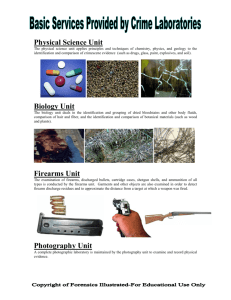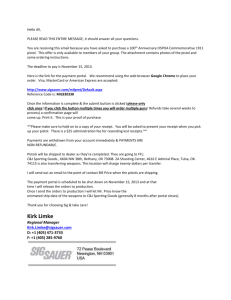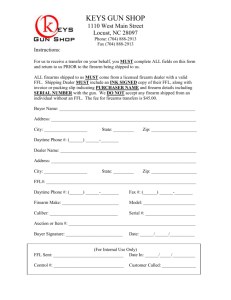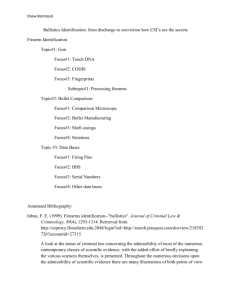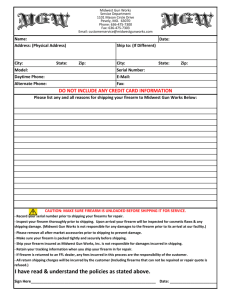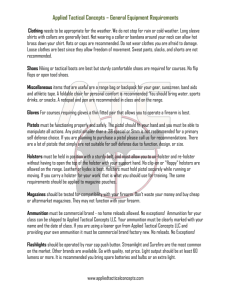Changes to Alabama's Gun Laws | Rep. Chris England
advertisement
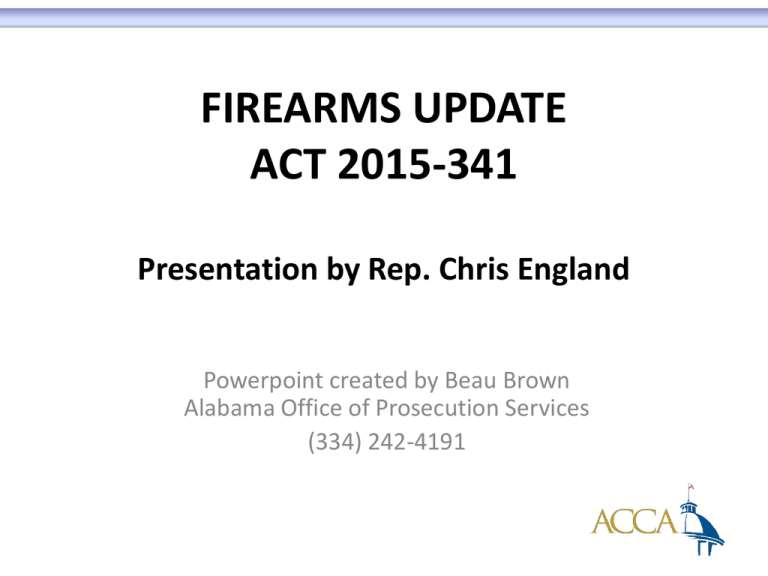
FIREARMS UPDATE ACT 2015-341 Presentation by Rep. Chris England Powerpoint created by Beau Brown Alabama Office of Prosecution Services (334) 242-4191 Amendments to the State Firearms Laws • HB47, now Act 2015-341, sponsored by Rep. Chris England amended a number of statutes affecting firearms. • Act 2015-341 is the result of negotiations involving a number of groups and elected officials, including Rep. Chris England, Rep. Ed Henry, the Alabama Sheriffs Association, Alabama Gun Rights, National Rifle Association, Association of County Commissions of Alabama, and the Alabama District Attorneys Association. • Act 2015-341 goes into effect on September 1, 2015. §13A-11-57 • §13A-11-57 is amended to now exempt any person who sells, gives, or lends any minor a pistol, bowie knife, or like knife from prosecution if that person provides the pistol or bowie knife under the specific circumstances set out in §13A-11-72(b). – These circumstances will be discussed later in this presentation, but generally allow a minor to possess a pistol with the permission of a parent or legal guardian, and while undertaking certain activities on specifically enumerated land or while under supervision of an adult. A violation by a minor of §13A-11-72(b) is a Class C misdemeanor. – The punishment provision of 13A-11-57 is not as significant as that of §13A-11-76, but covers the possession of more items (bowie knives and other like knives as well as pistols). • A paragraph was also added that prevents this statute from applying to a transfer by inheritance of title to, but not possession of, a pistol, bowie knife, or other knife of like kind or description to a minor. §13A-11-61.2(a) • §13A-11-61.2 was added to the Code in Act 2013-283, which set out prohibitions on where firearms may be carried. Remember that, per this statute, other state and federal law prohibitions set out in other statutes are also still applicable. • §13A-11-61.2(a)(3) was amended to remove the language related to the prohibition of a firearm on the premises of a facility which provides inpatient or custodial care of those with psychiatric, mental, or emotional disorders. The prohibition still applies inside such facility. – This was added to address concerns by individuals who drive to and park at a hospital to visit patients or see doctors and the hospital houses such a facility as part of the overall hospital. This amendment allows people to leave their firearms in their vehicles now that the word “premises” was removed. – Keep in mind that other prohibitions may apply, such as workplace restrictions under §13A-11-90(b) and federal law. §13A-11-61.2(b) • §13A-11-61.2(b) prohibits a person from possessing or carrying a firearm inside any facility or building to which access is limited by the continuous posting of guards and other security features. There are some exceptions. • Originally there was no punishment designation (felony, misdemeanor, violation). A recent opinion by the Court of Criminal Appeals dealing with another criminal statute with no punishment designation stated that the statute was unenforceable. The Alabama Supreme Court granted certiorari and the case is still pending. • This section is now a Class C misdemeanor, as listed in §13A-11-61.2(e). Thus, a person can be arrested, charged, and prosecuted for violating this section. – Keep in mind that subsection (c) requires a notice at the public entrances of such premises or buildings alerting those entering that firearms are prohibited. §13A-11-61.2(b) • An additional exception was included in this section. Now, nothing in §13A-11-61.2(b) restricts the possession, transportation, or storage of a lawfully possessed firearm or ammunition in an employee’s privatelyowned motor vehicle while parked or operated in a public or private parking area provided that the employee complies with the requirements of §13A-11-90. – This exception is strictly limited to employees of an employer imposing the restriction on the possession of firearms set out in §13A-11-61.2(b). – Other state and federal prohibitions still apply. – §13A-11-90(b) applies to employee vehicles and requires that the firearm, whether a pistol or firearm legal for hunting, must always be kept from ordinary observation. • If the employer can see the pistol or firearm, the remedy is for the employer to take an adverse employment action. A criminal charge is not set out in §13A-11-90. §13A-11-72 • Significant amendments were made to this statute, expanding the list of those individuals prohibited from possessing a firearm or a pistol. • Pursuant to subsection (a), now the following individuals are prohibited from possessing a firearm: – – – – – A person convicted of committing or attempting to commit a crime of violence; A misdemeanor offense of domestic violence; Any violent offense listed in §12-25-32; Anyone subject to a valid protection order for domestic abuse; and Anyone of unsound mind. • A violation of (a) is a Class C felony (§13A-11-84(a)). • Pursuant to subsection (b), no minor (with specific exceptions), drug addict, or habitual drunkard may own or possess a pistol. • A violation of (b) is a Class A misdemeanor (§13A-11-84(a)). §13A-11-72 Exceptions as to Minors Possessing • Subsection (f) sets out that a minor may lawfully possess a pistol only when the minor has permission to possess a pistol from a parent or legal guardian who is not a prohibited person as set out in state and federal law, and: – The minor is attending a hunter education course or firearm safety course under the supervision of an adult not prohibited from possessing a firearm; – The minor is engaging in practice in the use of a firearm or target shooting at an established range under the supervision of an adult not prohibited from possessing; – The minor is engaging in an organized competition involving the use of a firearm or participating in or practicing for a performance by an organized 501(c)(3) group; – The minor is hunting/fishing pursuant to a valid license, has the license in his/her possession, has the written permission of the landowner or legal possessor on which the hunting/fishing is occurring, and the pistol-when loaded-is carried openly; – The minor is on real property under the control of the minor’s parent, grandparent, or legal guardian; – The minor is a member of the Armed Services/National Guard and in the line of duty; – The minor is traveling by motor vehicle to any of the above listed locations/activities, has written permission by a parent or legal guardian, and the pistol is unloaded, locked in a compartment or container in or affixed to the vehicle and is out of the reach of all occupants; – Any minor who uses a pistol in self-defense of him/herself or others against an intruder into the residence of the minor or residence in which the minor is an invited guest. §13A-11-72 Definitions • Convicted-person was represented by counsel or knowingly/intelligently waived the right to counsel if required by law, and the case was tried before a jury or judge or the person knowingly/intelligently waived the right to have the case tried by guilty plea or otherwise. Not convicted if the person is not considered convicted in the jurisdiction where the proceedings were held or if the conviction was expunged, set aside, or if a pardon or reinstatement of civil rights, including gun rights, was granted. • Misdemeanor Offense of Domestic Violence-misdemeanor offense that has, as its elements, the use or attempted use of physical force or the threatened use of a dangerous instrument or deadly weapon, and the victim is a current or former spouse, parent, child, person with whom the defendant has a child in common, or a present/former household member. §13A-11-72 Definitions • Valid Protection Order-an order issued after a hearing of which the person received actual notice, and at which the person had an opportunity to participate, that does any of the following: – Restrains the person from harassing, stalking, or threatening a qualified individual or child of the qualified individual or person or engaging in other conduct that would place a qualified individual in reasonable fear of bodily injury to the individual or child and that includes a finding that the person represents a credible threat to the physical safety of the qualified individual or child; – By its terms, explicitly prohibits the use, attempted use, or threatened use of physical force against the qualified individual or child that would reasonably be expected to cause bodily injury. • Qualified Individual-spouse or former spouse of the person, an individual who is a parent of a child of the person, or an individual who cohabitates or has cohabitated with the person. §13A-11-72 Definitions • Unsound Mind-any person who is subject to any of the findings listed below, and who has not had his/her rights reinstated: – Found by a court, board, commission, or other lawful authority that, as a result of marked subnormal intelligence, mental illness, incompetency, condition, or disease, is a danger to himself or herself or others or lacks the mental capacity to contract or manage his or her own affairs; – Found to be insane, not guilty by reason of mental disease or defect, found mentally incompetent to stand trial, or found not guilty by a reason of lack of mental responsibility by a court in a criminal case, to include state, federal, and military courts; or – Involuntarily committed for a final commitment for inpatient treatment to the Department of Mental Health or a Veterans’ Administration hospital by a court after a hearing. §13A-11-76 • It is illegal to deliver a pistol to anyone listed in §13A-11-72(a) and (b). The person must have reasonable cause to believe that they fall into the categories listed in §13A-11-72(a) and (b). • A person may deliver a pistol to anyone who has had his/her firearm rights restored. Minors are still limited to those specific circumstances listed. • The definitions listed in §13A-11-72 are applicable in this statute, as are the specified exceptions allowing minors to possess a pistol. • A violation of this statute is a Class A misdemeanor (§13A-11-84(a)). §13A-11-79 and §40-12-143 • Both statutes remove State of Alabama information and reporting requirements of sales involving pistols. • Any records retained by chiefs of police, sheriffs, or the Secretary of State pursuant to §13A-11-79 are to be destroyed no later than 180 days after the effective date of the Act. – This requirement does not apply to any record necessary for an active investigation or ongoing prosecution. • Federal provisions and requirements remain in unchanged and intact. §13A-11-84 • Punishment provision. • Makes all violations of §13A-11-72(a) and §13A-11-81 a Class C felony. • Makes all violations of §13A-11-72(b), §13A-11-73, §13A-11-74, §13A-1176, and §13A-11-77 through §13A-11-80 a Class A misdemeanor. §22-52-10.8 • Upon a probate judge entering an order for the involuntary commitment of a person pursuant to §22-52-10.1, and if the order is for final commitment for inpatient treatment to the Department of Mental Health or a Veterans’ Administration hospital, or as otherwise provided by law, the probate judge must now immediately forward the order to ALEA so that the information can be entered into NICS. • There is no longer any additional finding to be made by a probate judge for this notification to occur. • A person subject to a firearms restriction pursuant to the restriction of unsound mind may still petition the district court for reinstatement of the right to possess a firearm. Section 2-Findings of Incompetency, Insanity, etc. • Upon a finding of insanity, mental incompetence, or not guilty by reason of mental disease or defect, pursuant to Chapter 16 of Title 15 or the Alabama Rules of Criminal Procedure, the judge shall immediately forward the order to ALEA to be entered into NICS. • Any person subject to a firearm restriction related to unsound mind as a result of any of the above listed findings may file in district court to have his or her rights restored. – In any such civil reinstatement action, the prosecutor and victim shall be served a copy of the petition by certified mail; and – Both shall be allowed to speak and the prosecutor may make recommendations to the court.
